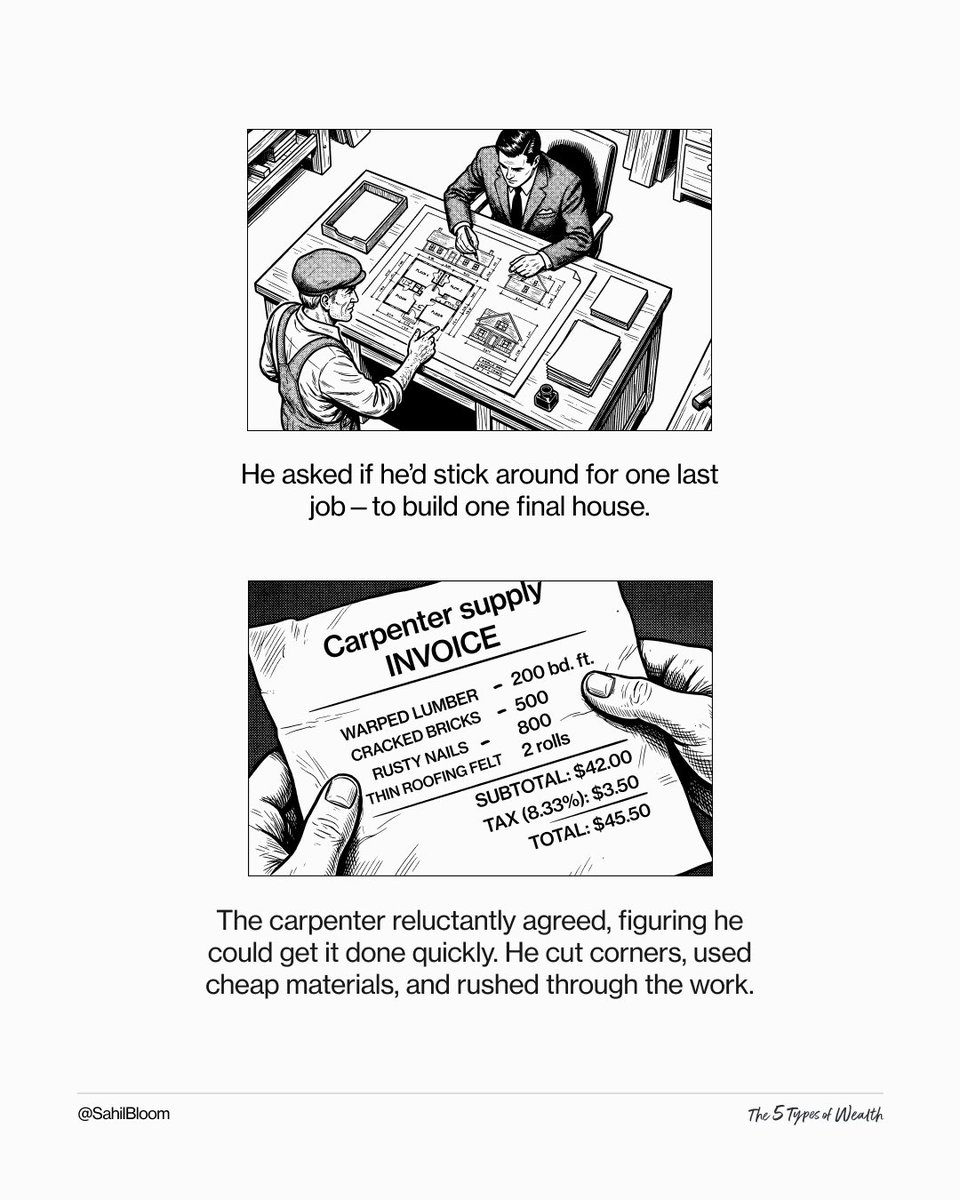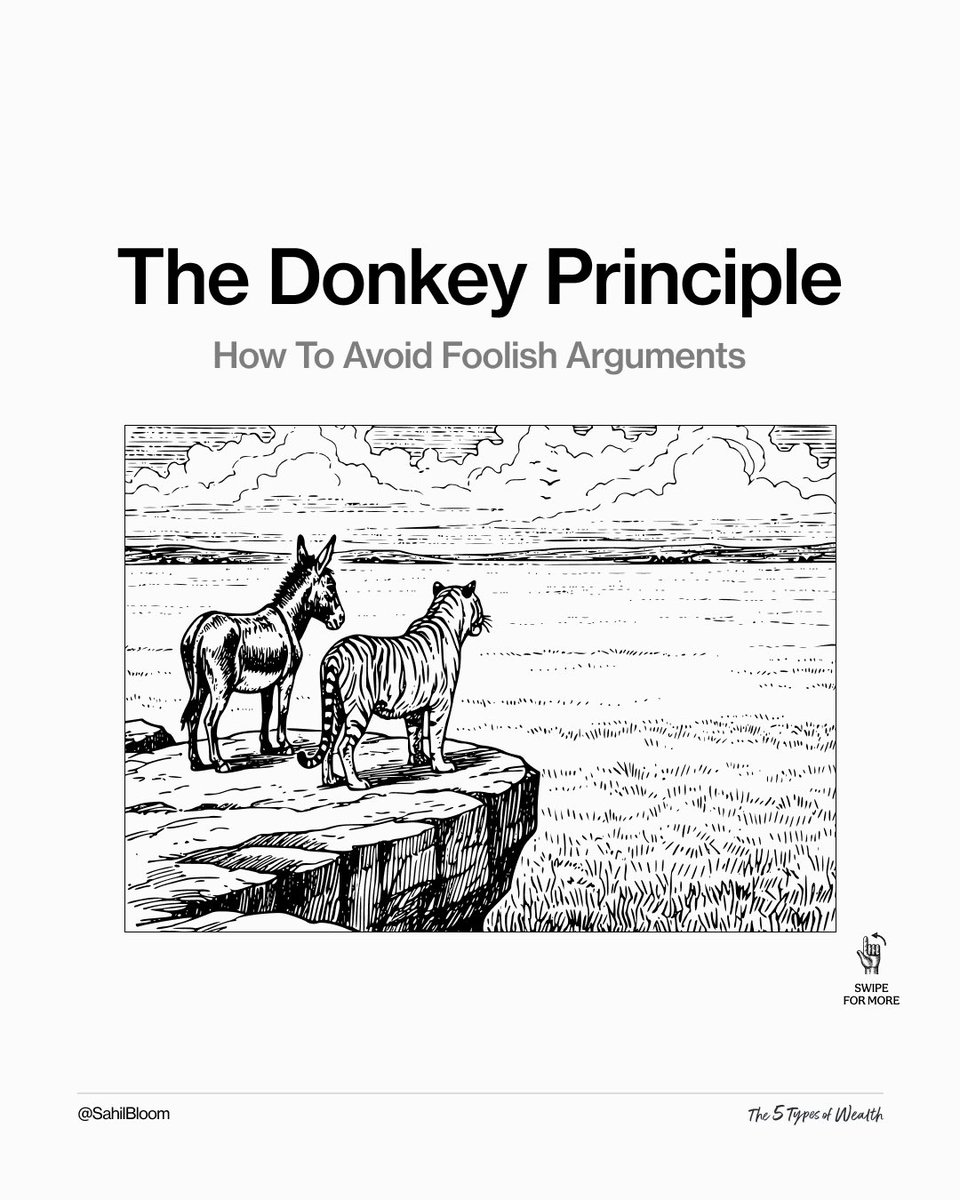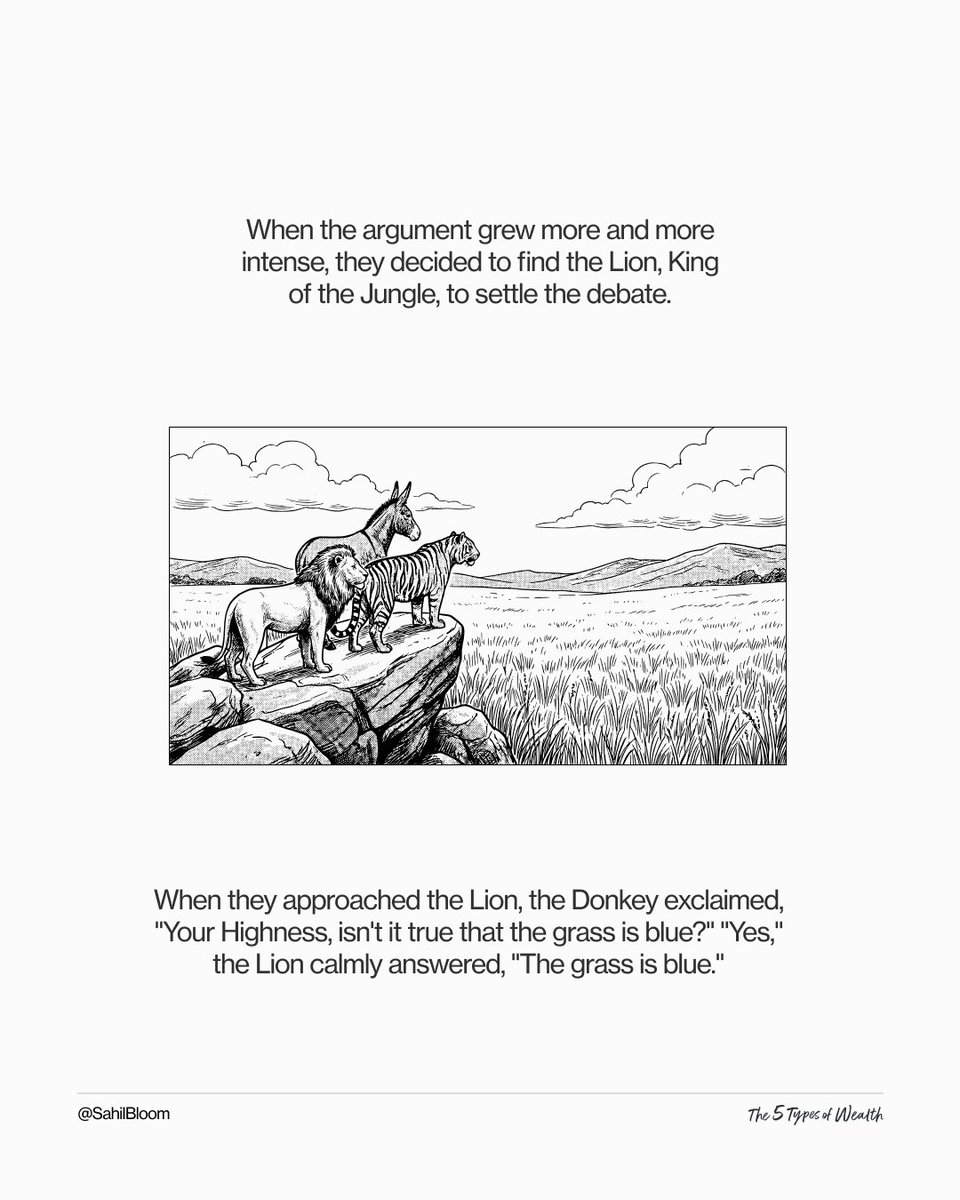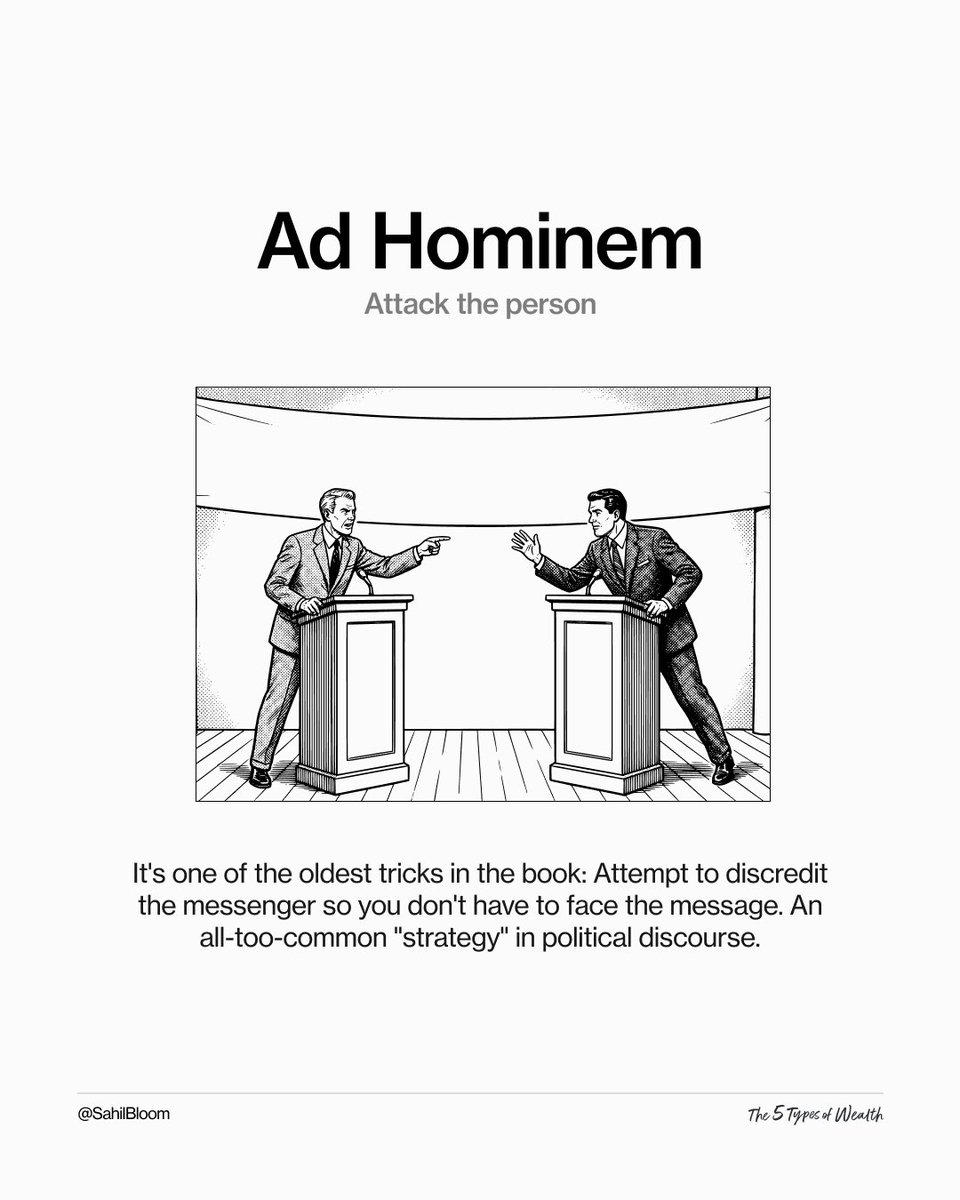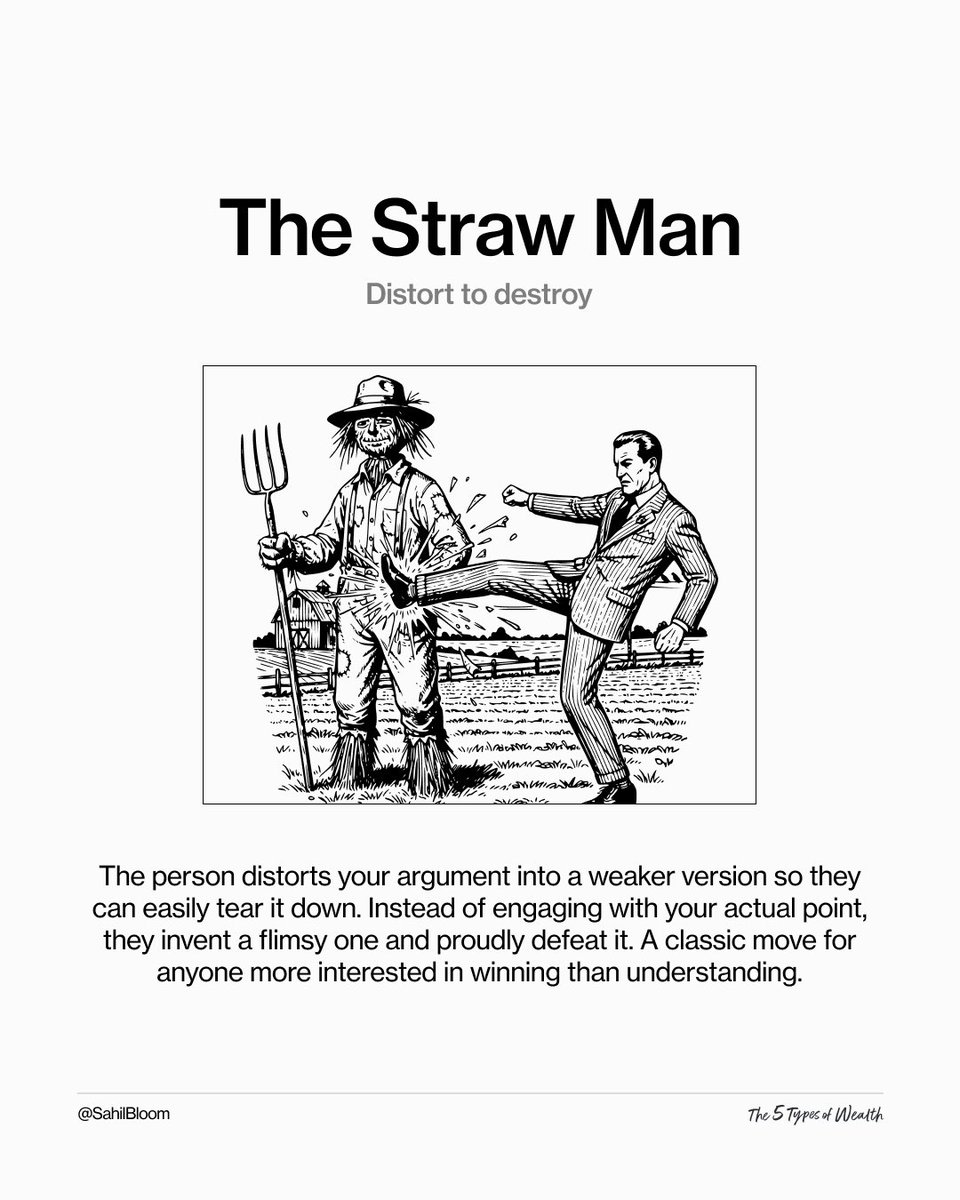“Razors” are rules of thumb that simplify decisions.
The most valuable razors I’ve discovered:
The most valuable razors I’ve discovered:
The Smart Friends Razor
If your smartest friends are all interested in something, it’s worth paying attention to.
If that something seems crazy, it's worth paying a lot of attention to.
The passions of the smartest people in your circles are a looking glass into the future.
If your smartest friends are all interested in something, it’s worth paying attention to.
If that something seems crazy, it's worth paying a lot of attention to.
The passions of the smartest people in your circles are a looking glass into the future.
The Rooms Razor
If you have a choice between entering two rooms, choose the room where you are more likely to be the dumbest one in the room.
Once you are in the room, talk less and listen more.
Bad for your ego, great for your growth.
If you have a choice between entering two rooms, choose the room where you are more likely to be the dumbest one in the room.
Once you are in the room, talk less and listen more.
Bad for your ego, great for your growth.
The Man in the Arena Razor
It's easy to throw rocks the sidelines—it's hard to step into the arena.
It's lonely and vulnerable, but it's where growth happens.
When faced with two paths, choose the path that puts you in the arena—choose the path with real skin in the game.
It's easy to throw rocks the sidelines—it's hard to step into the arena.
It's lonely and vulnerable, but it's where growth happens.
When faced with two paths, choose the path that puts you in the arena—choose the path with real skin in the game.
The Feynman Razor
Complexity and jargon are often used to mask a lack of deep understanding.
If you can’t explain it to a 5-year-old, you don’t really understand it.
If someone uses a lot of complexity and jargon to explain something to you, they probably don’t understand it.
Complexity and jargon are often used to mask a lack of deep understanding.
If you can’t explain it to a 5-year-old, you don’t really understand it.
If someone uses a lot of complexity and jargon to explain something to you, they probably don’t understand it.
The Serendipity Razor
Some of what we call luck is actually the macro result of 1,000s of micro actions.
Your daily habits put you in a position where luck is more likely to strike.
When choosing between two paths, choose the path that has a larger serendipity surface area.
Some of what we call luck is actually the macro result of 1,000s of micro actions.
Your daily habits put you in a position where luck is more likely to strike.
When choosing between two paths, choose the path that has a larger serendipity surface area.
The Uphill Decision Razor
When faced with two options, choose the one that’s more difficult in the short-term.
@naval calls this making "uphill decisions”—overriding your biological pain avoidance instinct.
It's worth it—short-term pain creates compounding long-term gain.
When faced with two options, choose the one that’s more difficult in the short-term.
@naval calls this making "uphill decisions”—overriding your biological pain avoidance instinct.
It's worth it—short-term pain creates compounding long-term gain.
The Rare Opportunity Razor
There is a rare class of opportunities that the average person will get 0 to 1 chances at in their lifetime.
They look scary, but have insanely asymmetric return profiles.
If you are fortunate to be faced with one of these opportunities, jump at it.
There is a rare class of opportunities that the average person will get 0 to 1 chances at in their lifetime.
They look scary, but have insanely asymmetric return profiles.
If you are fortunate to be faced with one of these opportunities, jump at it.
The Buffett Reputation Razor
“It takes 20 years to build a reputation and five minutes to ruin it. If you think about that, you'll do things differently.” - Warren Buffett
Your reputation is built over decades, but it's made of glass, not stone.
Remember that—act accordingly.
“It takes 20 years to build a reputation and five minutes to ruin it. If you think about that, you'll do things differently.” - Warren Buffett
Your reputation is built over decades, but it's made of glass, not stone.
Remember that—act accordingly.
The Narrative Fallacy Razor
Humans are storytelling creatures—we weave together sequences of events to identify cause-and-effect when the reality is just luck.
When reading stories of success, it's fair to assume they downplay the role of luck as a contributing factor.
Humans are storytelling creatures—we weave together sequences of events to identify cause-and-effect when the reality is just luck.
When reading stories of success, it's fair to assume they downplay the role of luck as a contributing factor.
The Time Billionaire Razor
Time is our most precious asset.
When choosing between two paths, choose the path that places the highest appreciation on the value of your time.
This is not about money—it's about leverage.
The path where you spend more time in your Zone of Genius.
Time is our most precious asset.
When choosing between two paths, choose the path that places the highest appreciation on the value of your time.
This is not about money—it's about leverage.
The path where you spend more time in your Zone of Genius.
The Opinion Razor
"I never allow myself to have an opinion on anything that I don’t know the other side’s argument better than they do." - Charlie Munger
Opinions are earned, not owed.
If you can't state state the opposition's argument clearly, you haven't earned an opinion.
"I never allow myself to have an opinion on anything that I don’t know the other side’s argument better than they do." - Charlie Munger
Opinions are earned, not owed.
If you can't state state the opposition's argument clearly, you haven't earned an opinion.
The Worrying Razor
If someone says "don't worry about it”—you should probably worry about it.
If you ask a question and the response involves an elevated voice, hand-waving, or scoffing—you should probably dig deeper on it.
"The lady doth protest too much, methinks."
If someone says "don't worry about it”—you should probably worry about it.
If you ask a question and the response involves an elevated voice, hand-waving, or scoffing—you should probably dig deeper on it.
"The lady doth protest too much, methinks."
The Boasters Razor
Truly successful people rarely feel the need to boast about their success.
If someone regularly boasts about their income, wealth, or success, it’s fair to assume the reality is a small fraction of what they claim.
Truly successful people rarely feel the need to boast about their success.
If someone regularly boasts about their income, wealth, or success, it’s fair to assume the reality is a small fraction of what they claim.
Newton’s Flaming Laser Sword
If something cannot be settled by experiment or observation, it is not worth debating.
This will save you from wasting a lot of time on pointless arguments—on the internet and in real life.
If something cannot be settled by experiment or observation, it is not worth debating.
This will save you from wasting a lot of time on pointless arguments—on the internet and in real life.
Hitchens’ Razor
What can be asserted without evidence can also be dismissed without evidence.
The burden of proof regarding a claim lies with the one who makes the claim.
If unmet, no argument is required to dismiss it.
What can be asserted without evidence can also be dismissed without evidence.
The burden of proof regarding a claim lies with the one who makes the claim.
If unmet, no argument is required to dismiss it.
The Grit Razor
If forced to choose between two people of equal merit, choose the one that has been punched in the face.
The one who has been punched—metaphorically or literally—is likely to have true grit.
Applies to investing (founders), hiring (candidates), and more.
If forced to choose between two people of equal merit, choose the one that has been punched in the face.
The one who has been punched—metaphorically or literally—is likely to have true grit.
Applies to investing (founders), hiring (candidates), and more.
The "Look the Part" Razor
If forced to choose between two options of seemingly equal merit, choose the one that doesn’t look the part.
The one who doesn’t look the part has had to overcome much more to achieve its status than the one who fit in perfectly.
h/t @nntaleb
If forced to choose between two options of seemingly equal merit, choose the one that doesn’t look the part.
The one who doesn’t look the part has had to overcome much more to achieve its status than the one who fit in perfectly.
h/t @nntaleb
Hanlon’s Razor
Never attribute to malice that which can be adequately explained by stupidity.
In assessing someone's actions, we should not assume negative intent if there is a viable alternative explanation—different beliefs, lack of intelligence, incompetence, or ignorance.
Never attribute to malice that which can be adequately explained by stupidity.
In assessing someone's actions, we should not assume negative intent if there is a viable alternative explanation—different beliefs, lack of intelligence, incompetence, or ignorance.
The Optimist Razor
When choosing who to spend time with, prioritize spending more time with optimists.
Pessimists see the doors that are closed. Optimists see the doors that are open—and probably kick down the closed doors.
Remember: Pessimists sound smart, optimists get rich.
When choosing who to spend time with, prioritize spending more time with optimists.
Pessimists see the doors that are closed. Optimists see the doors that are open—and probably kick down the closed doors.
Remember: Pessimists sound smart, optimists get rich.
The Pygmalion Razor
The Pygmalion Effect says that high expectations lead to high performance (and vice versa).
When working with new people and teams, choose to see each individual as their highest potential self—they will begin to achieve more.
h/t @KatColeATL
The Pygmalion Effect says that high expectations lead to high performance (and vice versa).
When working with new people and teams, choose to see each individual as their highest potential self—they will begin to achieve more.
h/t @KatColeATL
The "What Stays the Same" Razor
It's difficult to predict the future.
Jeff Bezos famously said that investing in what might change is risky, but investing in what will remain constant is safe.
When building for the future, focus on the constants—focus on what stays the same.
It's difficult to predict the future.
Jeff Bezos famously said that investing in what might change is risky, but investing in what will remain constant is safe.
When building for the future, focus on the constants—focus on what stays the same.
The Crazy Idea Razor
If someone proposes a seemingly crazy idea:
(1) Are they a domain expert?
(2) Are they reasonable?
If yes on (1) and (2), you should take the idea seriously, as it may be an asymmetric bet on the future.
h/t @paulg
If someone proposes a seemingly crazy idea:
(1) Are they a domain expert?
(2) Are they reasonable?
If yes on (1) and (2), you should take the idea seriously, as it may be an asymmetric bet on the future.
h/t @paulg
Those are 20+ of the most valuable razors I’ve discovered.
Follow me @SahilBloom for more threads on growth, business, and decision-making.
I will write a deep-dive on these razors in my newsletter. Join 66,000+ others and subscribe so you don’t miss it! sahilbloom.substack.com
Follow me @SahilBloom for more threads on growth, business, and decision-making.
I will write a deep-dive on these razors in my newsletter. Join 66,000+ others and subscribe so you don’t miss it! sahilbloom.substack.com
And be sure to check out my new podcast—Where It Happens—for deep dives with amazing guests on many of these razors, frameworks, and more. podcasts.apple.com/us/podcast/whe…
Since everyone is asking about Occam’s Razor, here’s the thread I wrote about it a while back!
Simple is beautiful.
Simple is beautiful.
https://twitter.com/sahilbloom/status/1326895385445593088
Wonderful visual summary from @SachinRamje! 

Adding a few more that I’ve found valuable:
The Steve Jobs Quality Razor
When building, take pride in carrying the quality all the way through.
Would you be proud for your work to be seen from every angle and perspective?
If not, keep working.
The Steve Jobs Quality Razor
When building, take pride in carrying the quality all the way through.
Would you be proud for your work to be seen from every angle and perspective?
If not, keep working.

Buffett’s Rule of Holes
“The most important thing to do if you find yourself in a hole is to stop digging." - Warren Buffett
When things aren’t working, change course and try something different.
When you find yourself at the bottom of a hole, stop digging and climb out of it.
“The most important thing to do if you find yourself in a hole is to stop digging." - Warren Buffett
When things aren’t working, change course and try something different.
When you find yourself at the bottom of a hole, stop digging and climb out of it.
The Duck Test
If it looks like a duck, swims like a duck, and quacks like a duck, it’s probably a duck.
You can determine a lot about a person by regularly observing their habitual characteristics.
If it looks like a duck, swims like a duck, and quacks like a duck, it’s probably a duck.
You can determine a lot about a person by regularly observing their habitual characteristics.
Machiavelli’s Razor
Never attribute to malice that which can be adequately explained by self-interest.
In assessing someone's actions, we should not assume negative intent if there is a viable alternative explanation that they are acting on rooted self-interest.
Never attribute to malice that which can be adequately explained by self-interest.
In assessing someone's actions, we should not assume negative intent if there is a viable alternative explanation that they are acting on rooted self-interest.
Occam’s Razor
The simplest explanation is often the best one.
Simple assumptions > complex assumptions.
Simple is beautiful.
The simplest explanation is often the best one.
Simple assumptions > complex assumptions.
Simple is beautiful.
• • •
Missing some Tweet in this thread? You can try to
force a refresh




